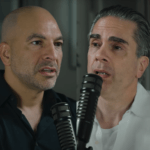This Tuesday marks the tragic anniversary of the death of Robin Williams. On August 11, 2014, Williams killed himself at his home in California. I still remember the exact intersection I was stopped at when my phone rang. I saw a friend’s name pop up on the screen of my car and thought, “Hmm, I haven’t heard from her in a few months. I wonder what’s up.” About a year earlier she and I had bonded over our shared obsession with much of Robin’s work and now of course she was calling to commiserate the loss of someone neither of us knew personally, but both of us felt a connection to.
Want more content like this? Check out our interviews with Kristin Neff on the power of self-compassion and Esther Perel on the effects of trauma.
On one level—right or wrong—we’ve come to accept such death from “tormented souls,” but most observers of Williams’s work, or of his life outside of work, would hardly think of him in those terms. (Some of my favorite Robin Williams improvisational mastery was his mock Tour de France commentary, his other superfan moments at cycling events, and riffs like this.) On another level, many of us react to these tragedies with anger.
Whenever there’s a suicide in the news, it’s accompanied by pundits explaining that taking your own life is a cowardly act. Not only is it the antithesis of bravery, these people tell you, but it’s also horribly selfish, especially if you have children. Ten days after Williams died, Henry Rollins wrote in his LA Weekly column that he could not understand how any parent would kill themselves—Robin was the father of three children—and regarded anyone who took their own life with disdain. “How in the hell could you possibly do that to your children?” Rollins asked.
Believing that suicide is an act of cowardice is not unique. It’s an understandable feeling if you haven’t experienced the sort of pain that leads to suicidal thoughts. Every year in the U.S., tens of millions of people think about suicide and tens of thousands carry out the act. But the majority of adults, approximately 9-in-10, go through life without ever thinking about killing themselves. I imagine it’s difficult for these people to feel empathy for someone who is suicidal. When people try to put themselves in the shoes of someone who is suicidal, they often think that person performs some calculation of personal happiness and pain without accounting for the friends and family they’ll leave behind. That may seem cowardly, but it’s also a completely inaccurate description of what most suicidal people are thinking.
Deaths of despair—mortality from drug overdoses, alcoholic liver disease, and suicide—are on the rise, increasing by 400%, 41%, and 38%, respectively, between 1999 and 2017. The social isolation, economic stress, and hopelessness related to the COVID-19 pandemic may be making matters even worse. A recent report by the CDC suggested that upward trends in excess deaths associated with COVID-19 may include deaths of despair.
After writing his article, Rollins was flooded with angry letters for several days. He read all of them and quickly realized he had a lot to learn about the issue. “I cannot defend the views I expressed,” Rollins wrote in a follow-up article. “I have no love for a fixed position on most things. I am always eager to learn something.”
Perhaps the main reason why Rollins had disdain for people that killed themselves is Rollins himself battled depression all his life, according to his blog post. Maybe he believed he could empathize with someone struggling with severe depression. But after reading the letters he received, many of them discussing severe depression, it looked like Rollins began to appreciate his lack of understanding. “What has perhaps kept me from seeing things differently about severe depression is that I am sure I don’t have it,” Rollins wrote.
I think it’s important to acknowledge that we may not truly understand what other people are going through, especially from a mental health perspective. It’s a lot easier to try and walk in someone else’s shoes than to try and put your head inside someone else’s brain. It was commendable for Rollins to apologize and show compassion to the people he hurt with his words. Suicide is an issue ripe for the five stages of grief. It’s probably all too common to be angry at someone close to you that took their own life and it’s also something that you may never fully understand and accept.
There’s often more to the story than we think we know. In May of 2014, Williams was diagnosed with Parkinson’s disease. An autopsy later revealed he actually had Lewy body dementia, a progressive disease that leads to a decline in thinking, reasoning, and independent function. His widow, Susan, said depression was just one of many symptoms he was dealing with. In 2016, Susan shared her story in Neurology hoping to help neurologists better understand their patients.
One of Robin Williams’s closest friends, Bobcat Goldthwait, told Williams’s son after his father’s death, “One of the biggest stars in the world died, and on the same day, your dad died.”
– Peter






Thanks Peter for talking about this issue. TED Talks posted a really good video last month on male suicide that I thought was very helpful on talking to friends who may be depressed. He explains a very simple conversation starter to help understand where people are at emotionally. Well worth watching.
Title: How Do You Stop Men Taking Their Own Lives? | Ben Akers | TEDxRoyalTunbridgeWells
Link: https://youtu.be/Y9FEQYp1imc
Jean Paul Sartre said something like the most important decision anyone makes in life is whether to commit suicide.
Many suicides seem to be impetuous. Of the few people who survive after jumping off of the golden gate bridge very few ever repeat trying to kill themselves.
But maybe in Robin Williams case it was more calculated.
I recently lost a friend to suicide. This is the second person in my close circle of friends to take his own life in the last 2 years. In this most recent tragedy, there was almost no warning. Certainly none that any of his friends were aware of. In fact, after the suicide of our friend in 2018, he told his partner he would *never* do something like that to her. Then, 2 weeks ago, he did. While she was at home. It was horrible and traumatic and sad. And we will never know what went on in his mind, but I can tell you this-suicidal people are not capable of rational thought in that moment. Despite the utter horror and trauma inflicted on his partner, she doesn’t want anyone to be angry with him for what he did. He wasn’t himself. He truly lost his mind in the grip of terror, despair and psychosis. Hindsight is always 20/20. Anyone who has lost a loved one to suicide will forever be looking back, and seeing “signs” that they didn’t realize were warnings at the time. And yet, even in attempting to intervene, it may not be enough, as we learned in 2018. If you’ve lost someone close to suicide, please don’t blame yourself. In discussions with people who have been suicidal, they will tell you that they can be rational and one minute and completely irrational and suicidal the next, and it can happen in an instant. In those suicidal moments, they become utterly convinced that their death is the best and only option, and have no capacity to understand or consider the implications to others. Please try to forgive those who take their own lives. They truly have no real understanding of the impact their actions.
I study the biological underpinnings of depression and I can tell you that many in the field consider suicidality a related but separate phenomenon and there are researchers, such as Dr Gustavo Turecki at the Douglas Institute, who are working to help us understand what drives this behaviour so we can have a hope of preventing needless deaths in future.
From personal experience I can tell you that one’s state of mind can change on a dime. It’s like being in a car crash. Totally fine one second, excruciating pain the next. Something is awry with the neurotransmitters. It usually doesn’t matter what is going on externally. Life stressors certainly affect neurotransmitters in a negative way, however. The longer the pain continues, the more neverending it feels. It truly seems absolutely intolerable in the moment. Like the form of torture where music is blasted in people’s ears for days. They’ll do anything just to make it stop.
Roger Sperry said “consciousness is an emergent property of a living brain” so I do not believe that suicide is a moral choice of the “soul” but rather is seen as the “logical” action of a somewhat scrambled brain. Not all suicides fall into this category but somehow I think that Robin William’s suicide did.
I learnt today that a friend was found dead in his house this week. I don’t know the details but it seems likely that he had taken his life. I met him though personal growth workshops, and I always admired how genuine he could be, how honest, open and emotional. I understand now how difficult that must have been for him. We all hope to show up and be real, but I guess we must also be ready to carry that experience. A reminder to myself to check in on friends who are striving for that authenticity. Thank you for sharing this Peter.
At 6:00 AM on August 11th , I had just sat down with my wife to eat breakfast. We were staying , across the street from Oracle’s headquarters in Redwood City . The TV monitor above us came on with breaking news of Robin Williams death. I immediately began sobbing and my wife says to me ” why are you reacting like that for someone that just committed a senseless act “? And my response was ” I feel his pain”. For me , the world lost a gentle soul that brought laughter to our lives.
Dr. A-
Great post, lot of thought packed into a small space. As an individual who has left my house more than once with no intention of coming back I appreciate your observation, “But the majority of adults, approximately 9-in-10, go through life without ever thinking about killing themselves. I imagine it’s difficult for these people to feel empathy for someone who is suicidal.”
I have had many frank conversations with people who love me that truly want to understand what it is that goes through my head (obviously I can only speak for myself as each of us has our own unique neurobiology and life circumstances). I will say that it takes an exceptionally rare individual with a unique theory of mind development to be able to glimpse that transition from looking at life as “wow, things are shitty and I’m not psyched and I don’t know when or how I’ll get through this but I’ll just put my head down and keep trudging through.” To, “I’ve been laying here on the floor for 2 days and I still can’t come up with a single good reason to give a fuck about continuing to play this asinine game… I just want out.”
Again these are just my very subjective thoughts and experiences battling my demons. Two things I find interesting when people discuss suicide.
1 “When people try to put themselves in the shoes of someone who is suicidal, they often think that person performs some calculation of personal happiness and pain without accounting for the friends and family they’ll leave behind.” I’m glad you put this in here… I have never found this to be the case, even comparing notes with friends of mine that also struggle with suicidal ideology. I’ve found that when I’m in that dark head space, it’s more of a feeling of being trapped, an overwhelming sympathetic drive to get the hell out but no positive aspects of the stress response. You shut down and give up and you go into tunnel vision where no calculation takes place and you’ve only got option A.
2 This is something that I’ve actually been exploring in my own thinking and writing some about. Without getting waaayyyy off into the weeds and at the risk of losing folks with an oversimplification or perhaps just a bad comparison. I’ve found myself having some success in dealing with my own issues regarding suicide by considering suicidal thinking in terms of addiction behavior.
I realized that there was a point in my life when I was depressed (WTF that means) but definitely not suicidal. At some point the idea of taking my own life to stop feeling what I was feeling seemed like a viable option. I believe that this is a critical step. Once you’ve let this djinn out of the lamp there’s no removing suicide as an option when life gets crappy. And the crappier things get the more attractive that option becomes. So basically suicide as a coping strategy. Personally I find the irony hysterical.
I hope that perhaps someone finds my thoughts on the subject helpful and if my sense of humor offended anyone, that was not my intent.
Cheers,
BA
Not exactly related but an interesting book none the less.
“Deep Survival” by Laurence Gonzales
Author Matt Haig (Notes on a Nervous Planet, Reasons to Stay Alive) quite literally kept me grounded just enough to not follow through with my thoughts of suicide. At one point he shared, either in the book or on an interview, that when a building is on fire, and you see people make a decision to jump – no one ever discusses that choice in a disparaging or judgmental way. Now, I get it, they may be jumping in hopes of surviving – so not suicidal in the way we typically think. And yet, it can also be fairly observed that there may in fact be a choice being made in that moment that many can’t understand. To Philip’s comment above, when there is a “fire in your brain” – extreme anxiety or depression – suicide can feel like a reasonable escape and a relieving one as well. Thankfully, my own brain fire has been quelled with good therapy, loving family, short term SSRI, and ongoing self care toward my own mental health. But I continue to be able to empathize with suicide vs. deem it weak minded, selfish, etc.
I’ve been an emergency physician for almost 30 years. I have seen too many people at the time of suicidal crisis. Some are crying out for help. Some are using it as a weapon against their family or significant others. Some actually want with all their being to die. I have to take them all very seriously. I thought I had a pretty good understanding of depression and suicidal ideation. And after the tragic suicides of Anthony Bourdain and Kate Spade I felt similar to Rollins thinking that it was a selfish act if you had kids. How could someone leave their kids with that burden? Then I had a friend who struggled with severe depression shed some light. In his eyes, it was not selfish and it was not that they did not consider their children. He thinks these people have such a poor opinion of themselves and feel so worthless in that moment they think the whole world, including their children and loved ones, would breath relief that they were no longer here messing up their lives too.
Now I consider myself lucky to have never even casually considered suicide, but this opinion gives me a paradigm with which to have more empathy for those in that situation.
Thanks so much, Peter. You have a way of being eloquent yet succinct when writing about these difficult issues.
I have very personal experience with both sides of suicide. Much more public education is needed regarding this issue. As you said, most people can’t comprehend why anyone would want to kill themselves. A friend killed himself several months ago and when aquaintences heard the news, they made comments about his life situation–“He had a great job,” “He was so happy in his relationship,” “He had everything going for him,” and the like. Awareness must be raised that this is a neurochemical issue. People who kill themselves just want the pain to stop. For them, the pain is caused by simply existing. We understand more when someone with terminal cancer or some other painful disease wishes to die.
Thanks again, Peter. I seriously mourned and continue to mourn Robin’s passing. Such a warm place in my heart for a man I’ve never met.
Retired after nearly 30 years as a writer, reporter, critic, and editor. Sometimes simultaneously, but usually not! Very recently developing Parkinson’s on top of Crohn’s on top of bronchiectasis. Oh, and there’s Sjogren’s as well. Sheesh. I have just just discovered Drive through the excellent episode with Lori Gottlieb. Sell me a ticket and teach me the secret handshake — I am blown away by the flow of the conversation, and look forward to many more. Many thanks ….